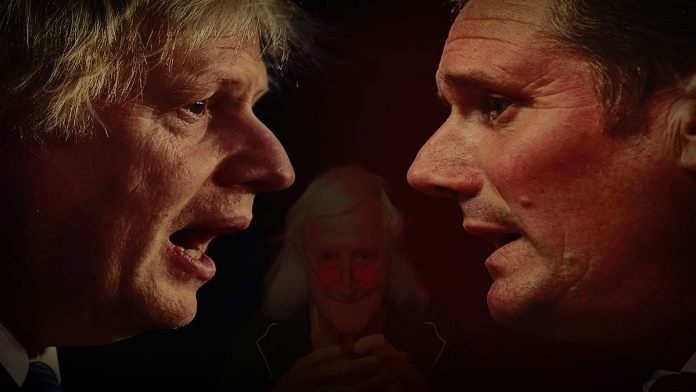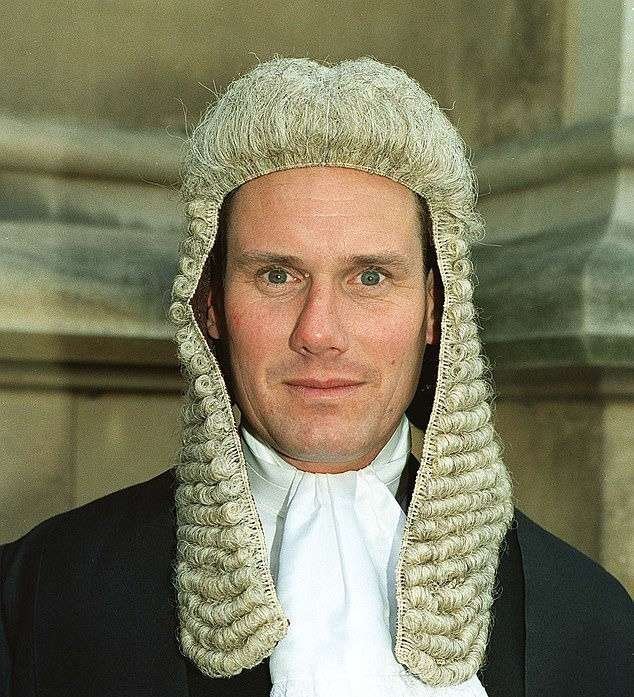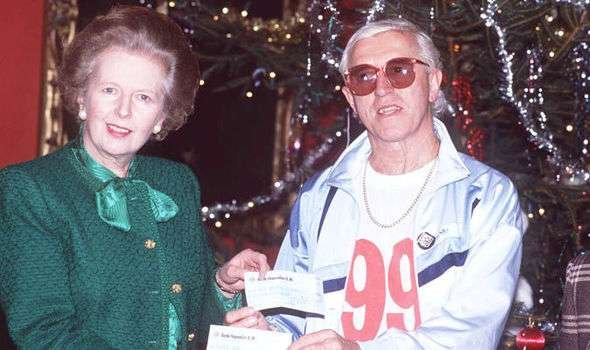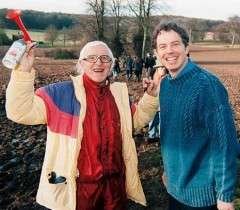
Boris Johnson’s premiership has been hit yet again with the tap, tap, tap of resignations carried out departures by four top aides gone in one day.
His policy chief Munira Mirza dramatically announced she was quitting over his use of a Jimmy Savile accusation against Sir Keir Starmer.
The Prime Minister appeared increasingly politically isolated after the Chancellor joined Mirza in condemning his ‘inappropriate and partisan’ attack on the Labour leader, linking him to a failure to prosecute notorious sex attacker Savile before his death in 2011.
Now both Starmer and Johnson will forever be caught up in the shadow of Jimmy Savile
Shouted out from the dispatch box Johnson claimed Starmer had “spent more time prosecuting journalists and failing to prosecute Jimmy Savile, as far as I can make out”.
Was a reference to Starmer’s involvement in locking up Julian Assange and of course, how as the head of the CPS his department conducted themselves during the investigation of Jimmy Savile, missing the opportunity to punish him during his lifetime and still on this Mortal Coil.
The Background.

Starmer was made Director of Public Prosecutions, head of the CPS, in 2008.
The CPS is responsible for prosecuting crimes in England and Wales. As part of this it decides which cases should be prosecuted and what defendants should be charged with. It is independent of the police and government.
During Sir Keir Starmer’s tenure as director of public prosecutions from 2008 to 2013, detectives had sought advice from the CPS on four allegations that Savile had sexually assaulted girls and young women in the 1970s.
In 2007 and 2008, Surrey Police investigated three complaints that Savile had “engaged in sexual behaviour with young girls”. During the same period, Sussex Police investigated a similar complaint involving a young woman.
Savile was interviewed under caution by police in October 2009 and denied wrongdoing. He was not arrested. No prosecution was brought in relation to any of the four complaints, on the grounds that none of the victims were “prepared to support any police action”, for example testifying in court.
Savile died in October 2011. Since his death, it has emerged that he sexually abused hundreds of children and women at locations including hospitals, schools and the BBC.
The review of the police investigation and CPS decision
In January 2013, after Savile’s death and when his abuse had been revealed, an investigation into whether the CPS had been right not to charge Savile in 2009 was published by Alison Levitt QC. She was asked to investigate this by Mr Starmer.
Ms Levitt said she had “reservations” about the prosecutor’s decision not to press charges.
She said: “On the face of it, the allegations made were both serious and credible; the prosecutor should have recognised this and sought to “build” a prosecution.”
She said the police treated the victims and the accounts they gave “with a degree of caution which was neither justified nor required”.
Three of the victims told her that if they had received more information from the police at the time of the investigation—and particularly if each had been told she was not the only woman who had complained—they would “probably have been prepared to give evidence.” Ms Levitt said that, in the case of two of the allegations, there would have been a “realistic prospect of conviction” if the women had given evidence.
“Having spoken to the victims I have been driven to conclude that had the police and prosecutors taken a different approach a prosecution might have been possible,” she wrote.
Ms Levitt is critical of the approach taken by both the CPS’ reviewing lawyer and the police in failing to build a prosecution against Savile in 2009, but said there was no evidence of any “improper motive on the part of either police or prosecutors”.
Following the review
When the investigation report was published in January 2013, Starmer said in a statement that he accepted the conclusions and hoped it would be a “watershed moment” for the CPS.
He said: “I would like to take the opportunity to apologise for the shortcomings in the part played by the CPS in these cases.
“These were errors of judgement by experienced and committed police officers and a prosecuting lawyer acting in good faith and attempting to apply the correct principles. That makes the findings of Ms Levitt’s report more profound and calls for a more robust response.” -Keir Starmer
Later in 2013, the CPS updated its guidance on prosecuting child sexual abuse in England and Wales.
A spokesperson for the CPS said that, “in line with the established data retention policy”, none of the records for the decision not to charge Savile in 2009 were kept.
He added: “There is no reference within the [investigation] report to any involvement from the DPP in the decision-making in the case. The reviewing lawyer at the time set out their own reasons for the decisions they took, which are reproduced in the report.”
There is no suggestion that officially Starmer had any involvement beyond his role as head of the CPS. however, it was one of the most explosive police interviews of the year — and you might reasonably expect that the head of the Crown Prosecution Service (CPS) would have been closely involved in checking that the case was being handled properly.
“Savile was not charged with any crime. We respectfully agree with the DPP who has concluded that there were no insurmountable barriers to a prosecution being undertaken. And so the question remains: why was there not a single charge laid against Savile. The DPP answers this in part and points toward the failure of the Sussex and Surrey investigations (the DPP was unaware of the MPS 2003 investigation) to work together with the CPS to “build” the cases.”
The question will always remain is Starmer to blame for the failure to bring Savile to justice?
That depends on whether you believe the person at the top of an organisation ultimately bears responsibility for mistakes that happen on his or her watch. And on that score, Starmer’s own position could not be clearer.
Leadership, Starmer has often opined, ‘is about taking responsibility’. ‘The culture of an organisation is set from the top.’
On that many fully agree and for many, that is precisely why Boris Johnson must go, but seems Starmer thinks that only applies to others in charge and not himself.
The stench from Savile will always be present in the dark corners of Westminster and anyone named will be forever tainted, guilty or not.

Whatever happens to Boris Johnson, no matter if he stays or goes. The accusation made towards Sir Keir Starmer over the role of the CPS in failing to convict Jimmy Savile will always remain.
It is now part and parcel of the Party Gate scandal and has designed will become part of the collective consensus, more so it will be whispered not just by the far-right as Starmer hit back but by every voter not wedded to Labour and Starmer’s new regime, as for Johnson and the Tory party no matter how some may protest, job done!

The slow trickle of resignations designed to create media pressure.
Meanwhile, within the Tory Party, the Byzantine plotting continues with the moving and sacrificing of chess pieces to bring constant pressure and headlines on Johnsons premiership.
No 10 spin chief Jack Doyle continued to add pressure as he announced he was resigning and told staff the Downing Street #partygate saga had taken a “terrible toll” on his family life.
The PM’s principal private secretary Martin Reynolds, who invited aides to a BYOB bash in the Downing Street garden in May 2020, and chief of staff Dan Rosenfield then offered their resignations.
The news will further rock Mr Johnson’s premiership as he fights to survive probes by top civil servant Sue Gray and Scotland Yard into lockdown-breaking parties.
Downing Street said Mr Reynolds and Mr Rosenfield had resigned after speaking to Mr Johnson – but speculation was rife that the pair had been sacked.
Mr Reynolds was the man who sent out an email inviting more than 100 staff to a ‘bring your own booze’ party in the No10 gardens at the height of lockdown in 2020.
Mr Rosenfield had also faced criticism for a perceived lack of control and discipline over the No10 machine.
A formerly pro-Boris MP told The Spectator: ‘The staff are always the last to leave! They’re normally there in Downing Street crying as the PM finally quits, they’re thinking about the resignation honours list. No government in my lifetime has ever imploded in this way.’
Another said ‘it’s not so much the rats leaving the sinking ship but the Petty Officer’.
A No10 spokesman said: ‘Dan Rosenfield offered his resignation to the Prime Minister earlier today, which has been accepted.
‘Martin Reynolds also informed the Prime Minister of his intention to stand down from his role as Principal Private Secretary and the Prime Minister has agreed to this.
‘He has thanked them both for their significant contribution to government and No 10, including work on the pandemic response and economic recovery.
‘They will continue in their roles while successors are appointed, and recruitment for both posts is underway.’
Whatever happens, come the next general election, all Starmer’s skeletons will come tumbling out, true or not.
Support Independent Journalism Today
Our unwavering dedication is to provide you with unbiased news, diverse perspectives, and insightful opinions. We're on a mission to ensure that those in positions of power are held accountable for their actions, but we can't do it alone. Labour Heartlands is primarily funded by me, Paul Knaggs, and by the generous contributions of readers like you. Your donations keep us going and help us uphold the principles of independent journalism. Join us in our quest for truth, transparency, and accountability – donate today and be a part of our mission!
Like everyone else, we're facing challenges, and we need your help to stay online and continue providing crucial journalism. Every contribution, no matter how small, goes a long way in helping us thrive. By becoming one of our donors, you become a vital part of our mission to uncover the truth and uphold the values of democracy.
While we maintain our independence from political affiliations, we stand united against corruption, injustice, and the erosion of free speech, truth, and democracy. We believe in the power of accurate information in a democracy, and we consider facts non-negotiable.
Your support, no matter the amount, can make a significant impact. Together, we can make a difference and continue our journey toward a more informed and just society.
Thank you for supporting Labour Heartlands











